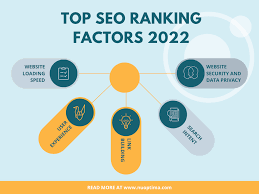The Importance of SEO Ranking in Digital Marketing
Search Engine Optimization (SEO) plays a crucial role in the success of any online business. At the heart of SEO lies the concept of ranking – where websites are positioned on search engine results pages based on various factors.
Having a high SEO ranking is essential for businesses looking to increase their online visibility and attract more organic traffic. When a website ranks higher on search engine results pages, it is more likely to be clicked on by users searching for relevant information or products.
SEO ranking is determined by a combination of on-page and off-page factors, including keyword relevance, content quality, backlinks, site speed, and mobile-friendliness. Search engines like Google continuously update their algorithms to ensure that websites with the most relevant and high-quality content are rewarded with top rankings.
Businesses that invest in improving their SEO ranking can benefit in numerous ways. Higher rankings lead to increased website traffic, which can result in more leads and conversions. Moreover, a strong SEO ranking builds trust and credibility with users, as they are more likely to view top-ranked websites as authoritative sources of information.
It is important for businesses to regularly monitor their SEO ranking and make adjustments to their strategies as needed. By staying informed about changes in search engine algorithms and trends in digital marketing, businesses can maintain or improve their rankings over time.
In conclusion, SEO ranking is a critical component of digital marketing that directly impacts a business’s online visibility and success. By focusing on improving their rankings through strategic SEO practices, businesses can enhance their online presence, attract more visitors, and ultimately achieve their marketing goals.
Five Essential SEO Ranking Strategies: Enhancing Content, Meta Tags, Speed, Backlinks, and Performance Analysis
- Create high-quality and relevant content that provides value to your audience.
- Optimize your website’s meta tags, including title tags and meta descriptions, with relevant keywords.
- Improve your website’s loading speed to enhance user experience and SEO performance.
- Build high-quality backlinks from reputable websites to improve your site’s authority.
- Regularly monitor and analyze your SEO performance using tools like Google Analytics to make data-driven improvements.
Create high-quality and relevant content that provides value to your audience.
Creating high-quality and relevant content that offers value to your audience is a fundamental tip for boosting SEO ranking. Search engines like Google prioritize websites that provide useful and engaging content to users. By crafting content that addresses the needs and interests of your target audience, you not only improve your chances of ranking higher in search results but also establish credibility and trust with your visitors. Remember, quality content is key to attracting organic traffic, increasing user engagement, and ultimately enhancing your online visibility and success.
Optimize your website’s meta tags, including title tags and meta descriptions, with relevant keywords.
To improve your SEO ranking, it is essential to optimise your website’s meta tags, such as title tags and meta descriptions, by incorporating relevant keywords. By strategically placing keywords in these elements, you can enhance the visibility of your website on search engine results pages and attract more organic traffic. Crafting compelling and keyword-rich meta tags not only helps search engines understand the content of your pages but also entices users to click through to your site. This simple yet effective strategy can have a significant impact on improving your overall SEO performance.
Improve your website’s loading speed to enhance user experience and SEO performance.
Improving your website’s loading speed is a valuable tip to boost both user experience and SEO performance. A fast-loading website not only provides visitors with a seamless browsing experience but also signals search engines that your site is responsive and user-friendly. By prioritizing loading speed, you can enhance user satisfaction, reduce bounce rates, and increase the likelihood of higher search engine rankings. Investing in optimising your website’s performance can have a significant impact on driving organic traffic and ultimately improving your SEO ranking.
Build high-quality backlinks from reputable websites to improve your site’s authority.
Building high-quality backlinks from reputable websites is a crucial strategy to enhance your site’s authority and improve SEO ranking. Backlinks act as a vote of confidence from other sites, signalling to search engines that your content is valuable and trustworthy. By earning backlinks from authoritative sources, you not only boost your site’s credibility but also increase the likelihood of ranking higher in search engine results pages. It is essential to focus on quality over quantity when it comes to backlinks, as a few relevant and authoritative links can have a more significant impact on your site’s authority than numerous low-quality links.
Regularly monitor and analyze your SEO performance using tools like Google Analytics to make data-driven improvements.
Regularly monitoring and analysing your SEO performance is essential for achieving success in the digital landscape. By utilising tools such as Google Analytics, businesses can gain valuable insights into their website’s performance and user behaviour. This data-driven approach allows for informed decision-making and enables businesses to identify areas for improvement in their SEO strategies. By continuously tracking and evaluating SEO metrics, businesses can adapt their tactics to enhance their online visibility, attract more organic traffic, and ultimately improve their search engine ranking.

